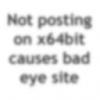The law is a complex subject, and the added complications of intellectual property rights and technology such as P2P conspire to make it even more difficult for anyone to know exactly where they stand. Especially given the media’s tendency to sensationalise the very limited action being taken against those few who have actually been caught filesharing.
This article is not intended to constitute a definitive guide to the law; it is intended only as a primer to help readers generally understand what is going on, and the facts underlying the sensationalistic coverage that filesharing has recently been getting in the media. The issues referred to within are geographically specific (generally USA/UK) and intended to refer to those filesharing copyrighted material for domestic purposes only.
FACTS AND THE MYTHS OF FILESHARING
Myth: Filesharing is illegal
Facts: No it isn’t illegal inasmuch that it does not constitute a criminal act
* If you are caught and if the matter is pursued, it is a civil matter between you and the recording industry and you could be sued.
* You cannot be arrested, searched, fined or imprisoned for filesharing. The recording industries do not have state support, they cannot simply search property at will or seize your possessions, they are private companies with no more rights than private individuals.
Myth: 16,000 people have been sued for filesharing
Facts: No they haven’t. The actual figure is around a handful
* The number of people who have actually been sued for filesharing by the recording industry amounts to little more than a handful
* None of these cases have actually been defended on the basis of filesharing, but on the basis of fair use, dismissal because it was someone else, etc.
* A letter demanding settlement does not amount to a lawsuit, or being “sued “
Myth: The recording industry always wins
Facts: No they don’t
* Over 75% of the people receiving demands for settlement in the 2 years ended September 2005 neither settled nor were taken to court
* No cases contested on the basis of filesharing have yet been heard by a judge
Myth: The risks of being caught filesharing are very high
Facts: They are not
* The risks of receiving a demand for settlement are 1 in around 4,000
* The risk of receiving a demand for settlement and then actually having to do so are around 1 in 17,000
* The risks of being taken to court for filesharing are around 1 in 12M
* Nobody has ever received a demand for settlement or been sued for downloading only. The risk of being the first to face such an action are in therefore the order of 1 in 60M
* More than 95% of those caught filesharing have been caught using Fastrack clients such as Kazaa
BACKGROUND
LEGALITY So dealing firstly with the legality of filesharing, is it actually illegal? The answer to that is no, it is not illegal as in contrary to criminal law. This means that your property cannot be searched and your possessions seized as evidence, you cannot be arrested, fingerprinted, held against your will, you do not risk fines, prison and so forth. It is a civil matter, what is known as a “tort” or civil wrong that is dealt with by the civil courts. If you are unfortunate enough to be identified as a filesharer, you risk receiving a demand for financial settlement and then being taken to court only if you do not settle up. Even then, nobody has been sued unless or until a court has formally granted an order against them. Why is it so important to distinguish between criminal and civil issues, apart from the obvious difference in penalties? Courts rely on different burdens of poof. In a criminal case, the burden of proof (or preponderance of doubt as it is otherwise known in the USA) requires that the prosecutors prove their claim against you beyond all reasonable doubt. And in doing so, your property can be searched, your possessions seized and forensic evidence sought to support their case. It is the lawyer’s primary aim to introduce doubt in any subsequent proceedings.
In a civil case (such as filesharing) the burden of proof is much lower, the plaintiffs (the civil equivalent of the prosecution) merely having to prove that, on the balance of probabilities, you did what they actually claim. This means that the court will listen to both sides of the argument, and will then decide the matter of the basis of whose evidence amounts to being the more persuasive. It is the lawyer’s primary aim in such cases to deal with procedural issues and to prepare a persuasive counter argument.
RISKS Up until the present time, the vast majority of those people who have received demands for settlement from the music industry have simply ignored them. The IFPI – the ruling international body for the recording industries - submitted the first set of reliable figures for the two years ending September 2005. These figures revealed that out of an estimated 60 million filesharers, only 15,597 were identified and sent a settlement demand in the USA, and even then, only 3,590 actually settled, with only 5 actually being taken to court. The odds of being identified and having to settle are therefore of the order of 3,590:60 million, or 16,713 to 1 against. The odds against being taken to court for downloading are an even more staggering 60 million to 1 against. These risks are diminutive, but with minimal precautions, they can be reduced further still.
DOWNLOADING/SHARING & BALANCING LEGAL RISKS Filesharing quite obviously means not only downloading but also uploading files using P2P technology. But if people don’t share, if everyone is a “leecher”, then there will be nothing to download.
Whilst downloading alone is obviously undesirable, it should be borne in mind that up until the present date, no action has ever been taken against downloaders. We often see headlines proclaiming “Downloading Mom Sued” and so forth, but in reality, these people have only come to the attention of the recording industries because they actually uploaded material.
Both downloading and uploading are defined as copyright infringement, with varying degrees of severity depending upon where you are situated. Whilst nobody who downloaded only has ever been threatened with action, the BPI (the UK equivalent of the RIAA) have gone further by stated on record that they currently have no plans to do so.
RECENT CASES The press abounds with sensationalised stories about law cases against fileharers, often failing to distinguish between the civil nature of the issue and a criminal act, settlement letters and being sued, downloading and uploading/sharing and so forth. This is a summary of the principle cases, and links are provided for further reading: Patti Santangelo:This case concerns juveniles using Mrs Santangelo’s computer and facilities for filesharing. Mrs Santangelo has denied responsibility for the acts of juveniles despite being invited to name them and bring an end to proceedings brought by the RIAA. The action therefore concerns filesharing, but sets no precedent. Attempts to have the motion were dismissed. The case for the defence rejects the assertion that the owner of a computer is responsible for the acts of other users and this case is ongoing. Candy Chan: This case has certain similarities. Mrs Chan was taken to court by the RIAA on the basis that her computer was used for filesharing by her juvenile daughter. The case was withdrawn by the RIAA in anticipation of dismissal, and rescheduled against Mrs Chan’s daughter. The case is ongoing. Cecilia Gonzalez: : In this case, Mrs Gonzalez admitted downloading 1,300 tracks which were not the subject of any action, but also sharing 30 tracks which she claimed she was sampling under the “fair use” provisions. Her fair use defence was dismissed and Mrs Gonzalez was sued. The case is now considered closed. Fred Lawson : In this case 67 year old grandfather Lawson was taken to court for $600,000 after rejecting an invitation to settle for $4,000 in respect of his 12 year old grandson’s filesharing activities. The action was halted by the MPAA in favour of a deal involving the grandfather giving assistance to the MPAA anti-piracy campaign. The case is now considered closed. Dawnell Leadbetter: In this case the Defendant also denies that she was the one filesharing, and is counterclaiming against Comcast. She alleges violations of the statute amount to "unfair or deceptive trade practices" and she has been granted an opportunity to more fully explain this position, and to consider fraud issues in the denands made of her. This case is ongoing. The Nelsons: In this case the RIAA relied heavily on evidence given by a member of staff working for the Nelsons at their in-home nursery. Because of the allegedly false and coerced initial testimony given by Granado, allegedly coerced by the RIAA, the Nelson’s lawyers are looking to have the case dismissed and attorney fees covered. This case is ongoing.
And above all, check the laws of your own country and make sure that you are making an informed decision regarding the risks and the possible consequences of your actions.

Filesharing: The Facts and the Myths
Started by
tnctx02
, Jan 16 2006 10:25 PM
2 replies to this topic
#1
Posted 16 January 2006 - 10:25 PM
#2
Posted 16 January 2006 - 10:57 PM
Great post
#3
Posted 17 January 2006 - 09:09 PM
ah cool, this should help me silence people or get them worried 
You can make facts and figures bring different results
For example if i have a graph showing me crime is up by 20%, turn the damn thing upside down and there you have it, Crime is down by minus 20%
You can make facts and figures bring different results
For example if i have a graph showing me crime is up by 20%, turn the damn thing upside down and there you have it, Crime is down by minus 20%
0 user(s) are reading this topic
0 members, 0 guests, 0 anonymous users














